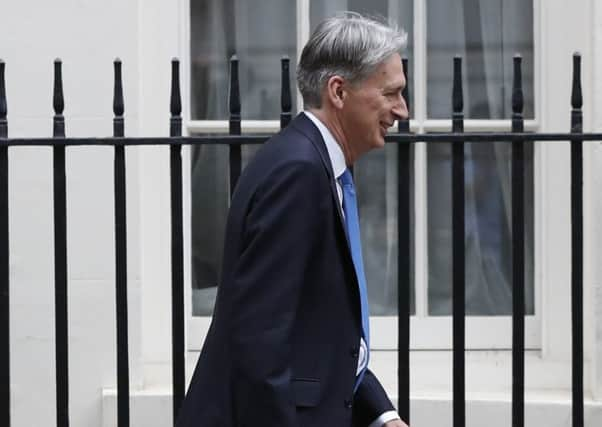Jim Duffy: A '˜thought shower' on the history of bulls*** bingo


I’m a big fan of innovation and, as we know, innovation is one per cent inspiration and 99 per cent perspiration. But, when I hear people innovating on new words, terms and phrases simply to appear smart or be in with the in-crowd, then I lose the will to live.
So does our Chancellor, Philip Hammond, it would appear. As he delivered his Autumn Budget, he also delivered a jibe at Cabinet colleague Michael Gove’s expense when he warned he would be using some “long, economicky” words. This was an apparent reference to the Environment Secretary’s tendency to use them in a way that has led to speculation he’s after the Chancellor’s job. Now it was time for Mr Hammond to “out” Mr Gove and have some fun at the dispatch box.
Advertisement
Hide AdAdvertisement
Hide AdThe world of business knows the perils of tortuous jargon all too well and this led an “innovative” form of resistance that our politicians might be well advised to study. Get ready to play “bulls*** bingo”.
So what is it and where does it all come from? And why is there such a need for some among us to create a bingo list of “bulls***” words?
This all stems from management consulting techniques that sprung up in the USA (where else?) from the 1980s onwards.
As big companies emerged from the Second World War, they wanted their staff, cultures and, ultimately, profits all to be so much better. Employees needed to be made to feel part of the firm with more accountability and responsibility for getting things right first time.
New words entered the lexicon of business such as “alignment”, “intentionality” and the bold “end-state vision”. And so a whole new era of words began to emerge, created by consultants and money-hungry universities that would peddle these out to senior and middle managers.
Unfortunately, senior and middle managers scooped up these new terms, internalised them and made damn sure they regurgitated them when speaking to their staff, at conferences and during their appraisals.
The vocabulary was putatively designed to awaken employees from their bureaucratic and dull gaze and open their eyes and minds to a new higher stream of consciousness.
A whole new raft of words began to emerge as wordsmiths and consultants smashed them together, creating new terms that now sit in the bulls*** bingo scorecards. By this, I mean it literally got to the stage that employees would score each other on how many bingo words were used during a meeting or conference speech simply to amuse themselves and have some office banter afterwards.
Advertisement
Hide AdAdvertisement
Hide AdMany of you will recognise these words as some are still in existence and are still used with much aplomb by the consultanty brigade. Words like “ideation”, “imagineering” and “creaction” all come into being. I’m guilty of using these myself to be honest.
As this business culture’s new lingo spread, public sector organisations joined in the fun as many of them paid huge sums to consultants to come in and re-invent how they operated. Out went the tea and sannies and in came the Americanos and croissants. It was here that I think the real damage was done, although it did lead to the creation of some of the best bingo words, many of which survive today.
My personal favourites include “braindump”, “drop the ball”, “tailwind”, “thought showers”, “date lake” and “iterative thinking”.
I recall working for a short time in the Criminal Investigation Department (CID) in the east end of Glasgow. There was a new detective chief inspector in town and he wanted to make his mark. The first thing he did was institute a register, rather like a class register, where big hairy detectives would have to report for duty to his room and duly sign in.
The register was placed on his desk, so the detectives would have to lean over to sign it. Thus, the detective chief inspector would be able to smell their breath and ascertain if they had been drinking. You can imagine how that went down with Glasgow East End detectives in the 1990s.
He mustered them all together, like new recruits, and started to pontificate about the new policy using bulls*** bingo words. Having established that they were all sober, he then floated a new idea on how to handle murder evidence. As he finished, he stated “Good, then let’s run it up the flagpole and see who salutes it!” This saying is now a classic. I watched as 20 hardened detectives sucked their cheeks in and went red in the face as they tried not to burst out laughing.
So, let’s “revisit” why Mr Gove is purportedly using “economicky” words at the Palace of Westminster. Is he showing that understands his own “core competencies” when it comes to numbers?
Or is he adopting a more “open source” approach to communication with his colleagues? After all, he does not want to end up “firefighting” if he gets it all wrong.
Advertisement
Hide AdAdvertisement
Hide AdMaybe he is “empowering” his team as he strives for closer “orientation”. Perhaps, he could even create a “dashboard” of “stakeholders” as he develops his new bingo card and the “bandwidth” of his department. And so it could go on as we paint the “big picture”.
I just hope that maybe now we should get over our use of bingo words and start to talk normally to each other. And perhaps Mr Hammond shouting “house!” on Mr Gove, could be a good start for us all. Managers take note.